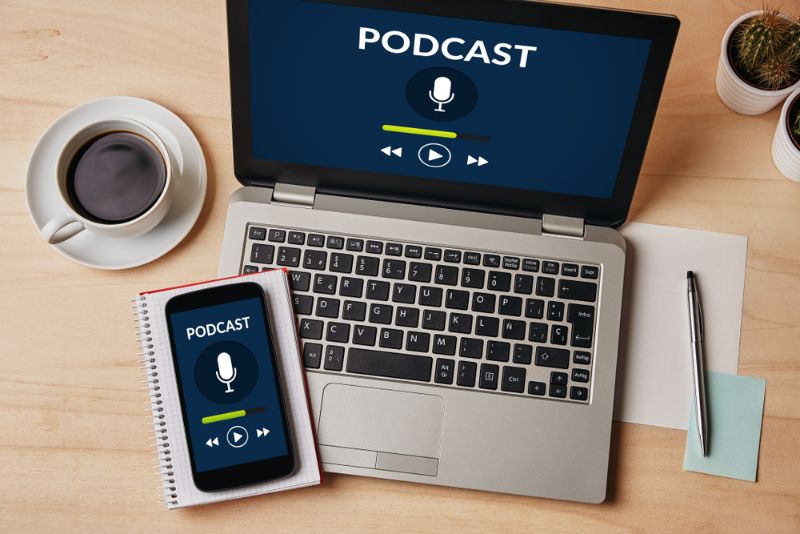Podcasting has grown immensely popular over the years, becoming a valuable medium for content creators to share their knowledge, interview experts, and engage in entertaining discussions. With the increase in listeners and the potential to amass a large audience, podcasting presents a promising opportunity for individuals to make money. Whether you’re just starting out or already have an established and successful podcast show, a few monetization strategies can help you turn your passion for audio content into a sustainable income source.
One of the main ways podcasters make money is through advertising and sponsorships. As your podcast gains popularity, advertisers will pay to promote their products or services during your show. Connecting with a relevant and engaged audience is crucial to attracting sponsors.
Another popular method for earning money from podcasting is by offering premium, subscriber-only content. This approach enables loyal fans to access exclusive episodes or bonus content for a fee, providing podcasters with stable recurring revenue.
Although there are more ways to monetize your podcast, these are two standard methods many successful podcasters employ. To succeed as a podcaster, focus on creating high-quality content, building an engaged audience, and looking for genuine, relevant partnerships with advertisers and sponsors that add value to your listeners while putting money in your pocket.

When it comes to making money with podcasting, there are a few revenue streams that podcast creators can consider:
To successfully monetize a podcast, podcasters must have a clear plan and understanding of different monetization strategies. Here are some tips to maximize podcast revenue:
Overall, understanding the range of podcast monetization methods and options and developing a solid strategy is crucial for podcasters looking to generate revenue from their podcast. With dedication, hard work, and a focus on delivering quality content, podcasters can successfully navigate the world of podcast monetization.

We mentioned that identifying and maintaining a community are critical aspects of monetization and should be incorporated as part of any podcast monetization strategy. Choosing a suitable podcast platform is crucial for ensuring the success of podcast management. Podcasts provide excellent opportunities for intimacy between the host and the audience. When someone listens to podcasts, he feels he knows the host or is there. Listeners enjoy podcasts because they have access to a broad audience, so if you use that authentically, you can grow the show and monetize it no matter what audience you target.
A few web hosting platforms exist, but none allow programmatic advertisements like Sprakers from the beginning. All podcasters should take into consideration these features when selecting a hosting service. The ability to create programmatic podcast ads, will enable you to make almost immediate money by placing advertisements in your back catalog. We will talk more directly about programmatic advertisements in the next part.
See Related: Get Paid Faster: How to Cash a Check Online Instantly
To build an audience of loyal podcast listeners, focus on creating engaging content that will resonate with your target demographic. You can start by understanding their interests and preferences and tailor your content accordingly. Here are a few tips for creating captivating content for your podcast:
Promoting your podcast on social media is crucial for building an audience and interacting with your existing listeners. Follow these practices to leverage social media for your podcast:
Please remember to track the performance of your social media posts and interactions to determine the best strategies for growing your podcast audience.
Among the finest popular ways to monetize a podcast is through direct sponsorships. The first step to finding sponsors is identifying potential partners that align with your podcast’s niche and audience. Could you research brands within your podcast sponsorship industry and make a list of potential sponsors? Materials like a media kit can be highly beneficial in showcasing your podcast’s statistics and demographics, helping to establish trust with potential sponsors.
Next, engage with those potential sponsors through networking events, social media, and outreach emails. Demonstrate your podcast’s value and explain how a partnership could benefit its target audience. Establishing relationships with sponsors can lead to long-term partnerships and continued revenue for your podcast.
When setting your podcast advertising rates, the Cost Per Mile (CPM) model is a common industry standard. CPM is the cost per 1,000 listeners for a given ad spot in your podcast. The CPM rates vary on ad length, audience size, niche, and timing.
Here are some general guidelines for podcast advertising CPM rates:
When negotiating with sponsors, determine an appropriate CPM based on your podcast’s unique attributes. Remember that while you want to be fairly compensated, having competitive rates will also make money podcasting your show more attractive to potential advertisers.
With direct sponsorships as a monetization strategy, podcasters can develop brand partnerships, set advertising rates based on the CPM, and establish trust with sponsors to generate consistent revenue.

Affiliate marketing is a popular and effective way for podcasters to generate income through their shows. This revenue-generating method involves promoting products or services from third-party companies and earning a commission for each sale made through your referral.
When deciding on which affiliate marketing program or programs to join, you have a few options, each offering a range of products or services to promote on your podcast. Some popular options include:
When selecting an affiliate program, consider the commission rates, the relevance of the products or services to your podcast’s niche audience, and the ease of integration within your content.
To effectively promote affiliate links on your podcast, you have a few strategies at your disposal:
Please remember to maintain a genuine, transparent approach when promoting affiliate products and ensure they align with your podcast’s core values.
See Related: Best Books on Making Money Online
For successfully monetizing your podcast with premium content, it is crucial to produce content that is both exclusive and valuable to your audience. This could include:
Remember to maintain a high level of quality for your premium content, as this will encourage your audience to continue subscribing and allow you to build a dedicated customer base.
Managing podcast subscriptions can be achieved through various platforms catering to this purpose. These platforms can help you to:
Some other popular podcast platforms to consider include Patreon, Memberful, and Supercast. To encourage your listeners to subscribe, consider implementing the following strategies:
You can effectively monetize your podcast and achieve sustainable revenue streams by combining well-produced, exclusive premium content with an efficient subscription management system.

Patreon is a popular platform to help podcasters collect donations and crowdfund their content. This service makes it easy to offer additional free content or bonuses depending on how much money people support you. Becoming successful on Patreon means setting up tiers with appealing rewards for your supporters.
While Patreon is a leading platform for podcast donations, it’s crucial to consider other options depending on your audience’s preferences. Some alternative media include:
Building a loyal supporter base is crucial to make the most out of crowdfunding and donations. The following tips can help you in this process:
Please remember to be genuine and authentic in your communication with your audience. By following these tips and using relevant platforms like Patreon, you can successfully build and monetize your podcast through crowdfunding and donations.
Creating custom merchandise is a great way to monetize your podcast and engage your audience. You can start by brainstorming ideas about your podcast’s theme or catchphrases. This will help you design t-shirts, stickers, posters, mugs, tote bags, journals, and more that your listeners will love. Please remember to use high-quality designs and consider hiring a graphic designer if you need a professional look.
Once you have your merchandise designs ready, it’s time to set up an online store to sell them. Shopify is an excellent platform for creating a user-friendly online shop. You can easily manage your inventory, track sales, and offer a seamless shopping experience for your fans.
Consider using a print-on-demand distribution model to streamline the process of creating and delivering the custom merch. In this model, a third-party prints and ships your products, saving you time and effort. This approach also reduces the risk of maintaining a large inventory of physical products.
Here are some steps to set up your online store:
In summary, selling custom merchandise is a fantastic way to monetize your podcast and improve listener engagement. Please create unique, high-quality designs and set up an easy-to-use online store.
By utilizing platforms like Shopify and taking advantage of print-on-demand services, you’ll create an enjoyable shopping experience for your fans and generate additional income for your podcast.
One effective way to monetize your podcast is by offering services and digital products to your audience. This gives you a more diverse revenue stream and builds a stronger connection with your listeners.
You can offer consulting or coaching services if you have expertise in a particular area or industry. Listeners who trust your knowledge and find value in your content might want to benefit more from you directly. You can offer different packages tailored to a range of needs, such as:
Remember to promote your consulting services in podcast episodes and on your website. The more value you provide, the higher the demand for your consulting or coaching services.
Another way to leverage your make money podcasting show’s success is by creating online courses for your audience. Educational content is a popular way to generate income and helps further establish your authority. Here’s what to do:
Additionally, consider offering exclusive podcast episodes only to the course participants. This adds more value to your online course, and strengthens the engagement with your audience.
You can create a more robust revenue stream and deepen the connection with your audience by offering services like consulting, coaching, and online courses alongside your podcast.
See Related: What is a Focus Group? Here’s What to Know

Building an email list can be a valuable asset for podcasters. By collecting the email addresses of your dedicated listeners, you can establish deeper relationships and promote new episodes, products, or services directly through email campaigns.
One way to grow your email list is through lead magnets like eBooks, exclusive content, or discounts on merchandise. You can offer these incentives in exchange for a listener’s email address and optimize your website for easy sign-ups. Once your list has grown, you can monetize it further with sponsored emails or affiliate promotions.
Organizing live events can be an excellent way to monetize your podcast and engage with your audience. These events can range from meet-and-greets to workshops or even live podcast recordings. You can generate revenue by offering tickets or merchandise for sale while simultaneously creating memorable experiences for your fans.
To ensure success, consider the following tips for live events:
Another avenue for monetization is speaking at conferences and events. These appearances boost your credibility, provide networking opportunities, and lead to paid speaker engagements. To increase your chances of being invited to speak or participate in panel discussions, focus on creating valuable and informative content that establishes you as an expert in your niche.
When preparing for conferences and events, adopt these strategies:
In summary, diversifying revenue opportunities through email marketing, live events, and conference appearances offers podcasters a sustainable and effective way to monetize their content. Implementing these strategies helps establish deeper relationships with your audience while expanding your possibilities for financial success.
The normal podcaster who gets tens of thousands of downloads can make anywhere from a few hundred dollars to 500 to 800. Those podcasts that make significant profits can reach as much as $30m annually.
But, there may be a clear possibility for podcasters to make money. Most present showrunners earn their living in these jobs. Some of us have enough money to cover host fees.
Podcasts charge advertisers based on how many users they’re watching. Cost per impression or CPM is derived from the price to sell ads out of 1,000 users and varies in value from $20 to $100 CPM.
Most podcasters start very little, and podcasting may be very successful if you stay engaged with them and create quality material consistently.
Generally, sponsors will want to have between 300 and 500 listeners per episode before taking a candidate for sponsorship. But, if you do it yourself, you can make decent sponsorship revenues when you get over 200 to 300.
A typical annual salary for a podcast host in the United States would be $75,487 by 2025. It is roughly $33.04 an hour. This equals $1401 a week or $6072 monthly.
Podcasts are intimate mediums and offer an effective method of selling your products or services. Is your podcast monetized by using a paid ad?
What are podcasting’s potential earnings? And that does it! The biggest brands receive huge listeners and revenue from podcast advertising networks. AdvertiseCast says 30 seconds of audio costs $11 and 60 seconds are $25.
Usually, if one gets about 10,000 podcasts a month, the podcaster could earn between 500 and 900 monthly for every download. Often the most successful podcasts generate more than $40m annually.
Podcasters are a great tool and can be used as a medium of entertainment in an ever-changing environment to generate new and multiple revenue streams. You can easily make audio and video courses into podcasts.
How can I earn from podcasts? Request money. If we don’t ask, we won’t get it. … Provide paid subscription levels. … Make sponsors or advertise. The… Make your own podcast ad free advertisement company. … Selling repurposed material. The “Factory of the Sphere” You should share this on YouTube. Selling Goods. … Talk.
Related Resources:
Last updated: October 25, 2023